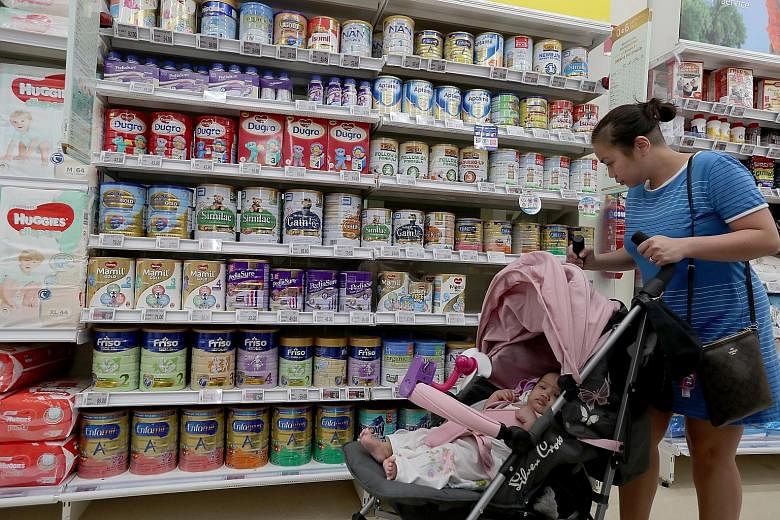Infant formula firms will soon be barred from providing both financial and in-kind inducements to hospitals to promote their brands to mothers, under changes to guidelines that govern the sale of infant foods in Singapore.
While cash payments were already disallowed, sponsorships in the form of hospital dinner and dance functions, for example, have been highlighted as problematic.
Public hospitals that offer maternity services are already prohibited from entering into such arrangements with formula companies.
The new rules are part of the revised code of ethics by a committee administered by the Health Promotion Board.
Making the announcement yesterday, Senior Minister of State for Health Amy Khor said the code's scope has been expanded to cover formula milk for infants aged up to 12 months, compared with six months previously.
More sponsorship restrictions have also been imposed to "reduce the reliance on infant formula by mothers", Dr Khor said.
Formula milk firms will have up to a year's grace period to abide by the revised code in their promotion and distribution practices. Adherence is obligatory, though there are no penalties for breaching the code.
-
12
-
Number of months' grace period formula milk companies will have to abide by the revised code in their promotion and distribution practices.
The review comes two years after the rising prices of formula milk prompted the formation of a government task force to tackle the issue, such as by tightening regulations on labelling and advertising and facilitating imports of more affordable options.
A report by the Competition and Consumer Commission of Singapore released in 2017 highlighted sponsorship and payment arrangements between manufacturers and private hospitals as "conflict of interest" deals that should be reviewed. Examples included manufacturers sponsoring conference and training course fees and materials. In return, their brands would be offered as the default formula milk in maternity rooms for a longer period. Parents tend not to switch after leaving the hospital, the report said.
Thomson Medical Centre said then that its suppliers paid for their brands to be part of the hospital's monthly rotation, and that most of the money was channelled to support activities that benefit patients.
A spokesman yesterday said it is "progressively reviewing our partnerships with all major milk companies" in order to be Baby-Friendly Hospital Initiative-certified.
Dr Chua Mei Chien, who heads KK Women's and Children's Hospital's neonatology department, said having stricter governance and greater transparency will help to prevent conflicts of interest between the formula companies and healthcare institutions.
The Singapore Infant Food Industry Self-Regulatory Committee, made up of the six major milk manufacturers here, including Nestle and Abbott, welcomed the revisions to the code. Its executive director Venetta Miranda told The Straits Times that the committee was heartened that a collaborative approach was taken in refreshing the code while "taking into account the national context and needs of mothers and infants in Singapore".


